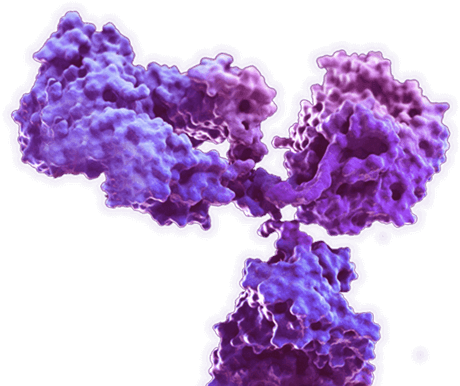Mouse Anti-Rhesus CDK2 Antibody (CBMOAB-38837FYA)
Cat: CBMOAB-38837FYA
Certificate of Analysis Lookup
To download a Certificate of Analysis, please enter a lot number in the search box below. Note: Certificate of Analysis not available for kit components.
Lot Number
To download a Certificate of Analysis, please enter a lot number in the search box below. Note: Certificate of Analysis not available for kit components.
Lot Number
| Size: | |
| Conjugate: | |
| Inquiry |
- Product Details
Specifications
| Host species | Mouse (Mus musculus) |
| Species Reactivity | Rhesus (Macaca mulatta) |
| Clone | MO38837FYA |
| Specificity | This antibody binds to Rhesus CDK2. |
| Format | Liquid or Lyophilized |
| Storage | Store at 4°C: short-term (1-2weeks) Store at -20°C: long-term and future use |
| Purity | > 90% was determined by SDS-PAGE |
| Purification | Purified with Protein A or G affinity chromatography |
Application Information
| Application | WB, ELISA |
| Application Notes | ELISA: 1:1000-1:3000 Other applications are to be developed. The optimal dilution should be determined by the end user. |
Target
| Introduction | Serine/threonine-protein kinase involved in the control of the cell cycle; essential for meiosis, but dispensable for mitosis. Phosphorylates CTNNB1, USP37, p53/TP53, NPM1, CDK7, RB1, BRCA2, MYC, NPAT, EZH2. Triggers duplication of centrosomes and DNA. Acts at the G1-S transition to promote the E2F transcriptional program and the initiation of DNA synthesis, and modulates G2 progression; controls the timing of entry into mitosis/meiosis by controlling the subsequent activation of cyclin B/CDK1 by phosphorylation, and coordinates the activation of cyclin B/CDK1 at the centrosome and in the nucleus. Crucial role in orchestrating a fine balance between cellular proliferation, cell death, and DNA repair in human embryonic stem cells (hESCs). Activity of CDK2 is maximal during S phase and G2; activated by interaction with cyclin E during the early stages of DNA synthesis to permit G1-S transition, and subsequently activated by cyclin A2 (cyclin A1 in germ cells) during the late stages of DNA replication to drive the transition from S phase to mitosis, the G2 phase. EZH2 phosphorylation promotes H3K27me3 maintenance and epigenetic gene silencing. Phosphorylates CABLES1 (By similarity). Cyclin E/CDK2 prevents oxidative stress-mediated Ras-induced senescence by phosphorylating MYC. Involved in G1-S phase DNA damage checkpoint that prevents cells with damaged DNA from initiating mitosis; regulates homologous recombination-dependent repair by phosphorylating BRCA2, this phosphorylation is low in S phase when recombination is active, but increases as cells progress towards mitosis. In response to DNA damage, double-strand break repair by homologous recombination a reduction of CDK2-mediated BRCA2 phosphorylation. Phosphorylation of RB1 disturbs its interaction with E2F1. NPM1 phosphorylation by cyclin E/CDK2 promotes its dissociates from unduplicated centrosomes, thus initiating centrosome duplication. Cyclin E/CDK2-mediated phosphorylation of NPAT at G1-S transition and until prophase stimulates the NPAT-mediated activation of histone gene transcription during S phase. Required for vitamin D-mediated growth inhibition by being itself inactivated. Involved in the nitric oxide- (NO) mediated signaling in a nitrosylation/activation-dependent manner. USP37 is activated by phosphorylation and thus triggers G1-S transition. CTNNB1 phosphorylation regulates insulin internalization. Phosphorylates FOXP3 and negatively regulates its transcriptional activity and protein stability (By similarity). Phosphorylates CDK2AP2 (By similarity). Phosphorylates ERCC6 which is essential for its chromatin remodeling activity at DNA double-strand breaks (By similarity). |
| Product Overview | Mouse Anti-Rhesus CDK2 Antibody is a mouse antibody against CDK2. It can be used for CDK2 detection in Western Blot, Enzyme-Linked Immunosorbent Assay. |
| Alternative Names | CDK2 |
| UniProt ID | F6ZHC1 |
| Protein Refseq | The length of the protein is 298 amino acids long. The sequence is show below: MENFQKVEKIGEGTYGVVYKARNKLTGEVVALKKIRLDTETEGVPSTAIREISLLKELNHPNIVKLLDVIHTENKLYLVFEFLHQDLKKFMDASALTGIPLPLIKSYLFQLLQGLAFCHSHRVLHRDLKPQNLLINTEGAIKLADFGLARAFGVPVRTYTHEVVTLWYRAPEILLGCKYYSTAVDIWSLGCIFAEMVTRRALFPGDSEIDQLFRIFRTLGTPDEVVWPGVTSMPDYKPSFPKWARQDFSKVVPPLDEDGRSLLSQMLHYDPNKRISAKAALAHPFFQDVTKPVPHLGL. |
See other products for " cdk2 "
| MO-AB-02277H | Mouse Anti-Frog cdk2 Antibody (MO-AB-02277H) |
| MO-AB-69460W | Mouse Anti-Silkworm CDK2 Antibody (MO-AB-69460W) |
| MO-AB-16388W | Mouse Anti-Chimpanzee CDK2 Antibody (MO-AB-16388W) |
| MO-AB-14522Y | Mouse Anti-Sheep CDK2 Antibody (MO-AB-14522Y) |
| MO-AB-52702W | Mouse Anti-Marmoset CDK2 Antibody (MO-AB-52702W) |
| CBMOAB-01200HCB | Mouse Anti-C. elegans CDK2 Antibody (CBMOAB-01200HCB) |
| MO-AB-36880W | Mouse Anti-Goat cdk2 Antibody (MO-AB-36880W) |
| MO-AB-42993W | Mouse Anti-Hamsters CDK2 Antibody (MO-AB-42993W) |
| MO-AB-07546Y | Mouse Anti-Rabbit CDK2 Antibody (MO-AB-07546Y) |
| MO-AB-09973R | Mouse Anti-Cattle CDK2 Antibody (MO-AB-09973R) |
For Research Use Only | Not For Clinical Use.
Online Inquiry


